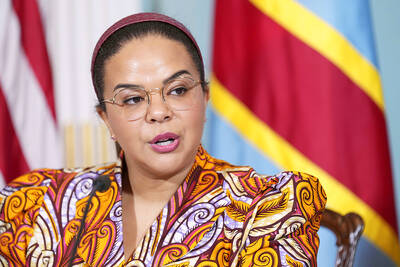Libya wants to open a new chapter in relations with the US by tapping into a major government fund to invest in US companies and sending thousands of students to study in the US, the son of Libya’s leader said.
In an interview on Friday, Seif al-Islam Qaddafi also outlined plans for Libya to move from the one-man rule of his father, Libyan leader Muammar Qaddafi, to a constitutional democracy as part of the country’s modernization process.
The younger Qaddafi said he expected a constitution providing for democratic elections to be adopted by September next year — the 40th anniversary of the 1969 revolution that brought his father to power.
He said he also expected Libya to modify its central government to a model similar to the US federal government, with strong regional and local governments.
Seif al-Islam Qaddafi, who was a key figure in normalizing Libya’s relations with the US, left the political stage in August and is on a private visit to the US. But his visit had definite political overtones, including meetings with US Secretary of State Condoleezza Rice, other administration officials and many federal legislators.
It also coincided with Friday’s confirmation of Gene Cretz as the first US ambassador to Libya in 36 years. Seif al-Islam Qaddafi was in Washington on Thursday when the Senate approved the appointment after it was verified families had received full compensation from Libya for the loss of relatives in the 1988 bombing of Pan Am flight 103 over Lockerbie, Scotland. The bombing killed 180 Americans.
This week’s events capped a halting, five-year rapprochement between the two countries that began in 2003 when the Libyan leader renounced terrorism and weapons of mass destruction. The process gained traction in August when the US and Libya agreed on the compensation deal.
The younger Qaddafi said his main message was: “We are good people, and nice. We’ll make business. We’ll invest. We have friends here in the states and we have a new chapter in the relations.”
He said Libya’s sovereign wealth fund, a government-owned investment fund of almost US$100 billion, “wants to invest here in America” despite the current financial crisis. He didn’t say how much Libya would invest.
Because the fund is new, he explained, “we avoided that tsunami, the big wave. We escaped that risk, and now we are in good shape to invest right now.”
Libya hopes that some of the US businesses it invests in will transfer technology to the North African country “like other countries are doing,” he said.
Libya’s other major focus is promoting education links with the US and it expects to sign a cultural and educational agreement with the US government next month, he said.
“We hope to send ... thousands of our students to study here. And also, we are talking right now with many American schools and universities to come and operate in Libya,” he said.

STEPPING UP: Diminished US polar science presence mean opportunities for the UK and other countries, although China or Russia might also fill that gap, a researcher said The UK’s flagship polar research vessel is to head to Antarctica next week to help advance dozens of climate change-linked science projects, as Western nations spearhead studies there while the US withdraws. The RRS Sir David Attenborough, a state-of-the-art ship named after the renowned British naturalist, would aid research on everything from “hunting underwater tsunamis” to tracking glacier melt and whale populations. Operated by the British Antarctic Survey (BAS), the country’s polar research institute, the 15,000-tonne icebreaker — boasting a helipad, and various laboratories and gadgetry — is pivotal to the UK’s efforts to assess climate change’s impact there. “The saying goes

Floods on Sunday trapped people in vehicles and homes in Spain as torrential rain drenched the northeastern Catalonia region, a day after downpours unleashed travel chaos on the Mediterranean island of Ibiza. Local media shared videos of roaring torrents of brown water tearing through streets and submerging vehicles. National weather agency AEMET decreed the highest red alert in the province of Tarragona, warning of 180mm of rain in 12 hours in the Ebro River delta. Catalan fire service spokesman Oriol Corbella told reporters people had been caught by surprise, with people trapped “inside vehicles, in buildings, on ground floors.” Santa Barbara Mayor Josep Lluis

Police in China detained dozens of pastors of one of its largest underground churches over the weekend, a church spokesperson and relatives said, in the biggest crackdown on Christians since 2018. The detentions, which come amid renewed China-US tensions after Beijing dramatically expanded rare earth export controls last week, drew condemnation from US Secretary of State Marco Rubio, who on Sunday called for the immediate release of the pastors. Pastor Jin Mingri (金明日), founder of Zion Church, an unofficial “house church” not sanctioned by the Chinese government, was detained at his home in the southern city of Beihai on Friday evening, said

SANCTIONS: Congolese Minister of Foreign Affairs Therese Kayikwamba Wagner called on the EU to tighten sanctions against Rwanda during an event in Brussels The Democratic Republic of the Congo (DR Congo) has accused the EU of “an obvious double standard” for maintaining a minerals deal with Rwanda to supply Europe’s high-tech industries when it deployed a far-wider sanctions regime in response to the war in Ukraine. Congolese Minister of Foreign Affairs Therese Kayikwamba Wagner urged the EU to levy much stronger sanctions against Rwanda, which has fueled the conflict in the eastern DR Congo, describing the bloc’s response to breaches of the DR Congo’s territory as “very timid.” Referencing the EU’s response to Russia’s invasion of Ukraine, she said: “It is an obvious double standard